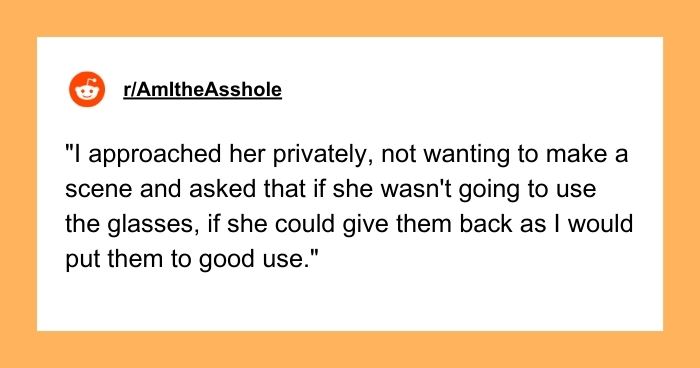‘AITA for asking my friend to give back a gift I gave her after she openly expressed that she would be getting rid of it?’
That’s textbook intent versus impact. As a thoughtful friend, you went the extra mile to select a tasteful gift that fitted Mary’s high-end lifestyle well. Considering you are still recovering from your student loans and working on filling your first apartment, it was certainly generous but also an affordable gift. A set of crystal champagne glasses– you just really thought they’d be ideal for enjoying after I close out a big sale, and you eventually found them at an estate sale and they were cheap–great!
But Mary clearly expects something else (and we know this purely from her response). You thought the glasses were a classy way to say something about, you know, life and stuff, while to her they were just secondhand and tacky, probably because she wanted more diamonds or something and also because some people are against used things. It was rude to behave passive-aggressively at the brunch and to discuss your gift behind your back. When you very privately and calmly asked her for the glasses back (this move was kinda useless as she clearly had no intentions of keeping them.) Besides, if she was going to throw it away, why not repurpose a perfectly good gift?
Read for more info Reddit










Here were the top rated comments from readers in response to the OP’s post:
Gifts can be a surprisingly complex social contract. Generally speaking, once a gift is given, it’s considered bad form to ask for it back—this is rooted in social norms and etiquette traditions. But, there are exceptions, especially when the recipient openly disrespects the gift or expresses disdain for it, as Mary did. Your request wasn’t about being petty—it was about practicality and respect for the value of the item.
From a psychological standpoint, gift-giving theory suggests that gifts carry emotional and symbolic meaning, often reflecting the bond between the giver and the recipient. In this case, your gift was thoughtful and considerate, aligned with what you believed would suit Mary’s tastes. However, her reaction suggests she may value the source of items just as much as their appearance or function. Some people associate secondhand items with negative connotations, regardless of the actual quality.
Looking at social etiquette experts, the general consensus is that while asking for a gift back isn’t ideal, it can be understandable in situations where the gift is unappreciated or disrespected. Since Mary made it clear she didn’t value your gift—and was even planning on throwing it away—your polite, private request was both reasonable and respectful.
On the flip side, Mary’s reaction reflects poor etiquette on her part. It’s widely considered inappropriate to openly criticize a gift or gossip about it, especially during the event where it was given. If she truly felt uncomfortable with receiving a secondhand item, the polite and mature response would have been to thank you graciously and later decide what to do with it without making you feel embarrassed or uncomfortable.









You put genuine thought and care into choosing a gift you believed Mary would love, all while balancing your own financial realities. Her reaction wasn’t just ungracious—it was unnecessarily hurtful and disrespectful. Asking for the glasses back, especially after she expressed disdain for them, was a reasonable and respectful request. While some might argue that once a gift is given, it’s no longer yours to reclaim, this situation stands out because of Mary’s blatant disregard for your effort and the item itself.
In short: You respected her feelings by asking privately, while she disrespected your gesture by gossiping and being passive-aggressive. You’re definitely not the a-hole here.

